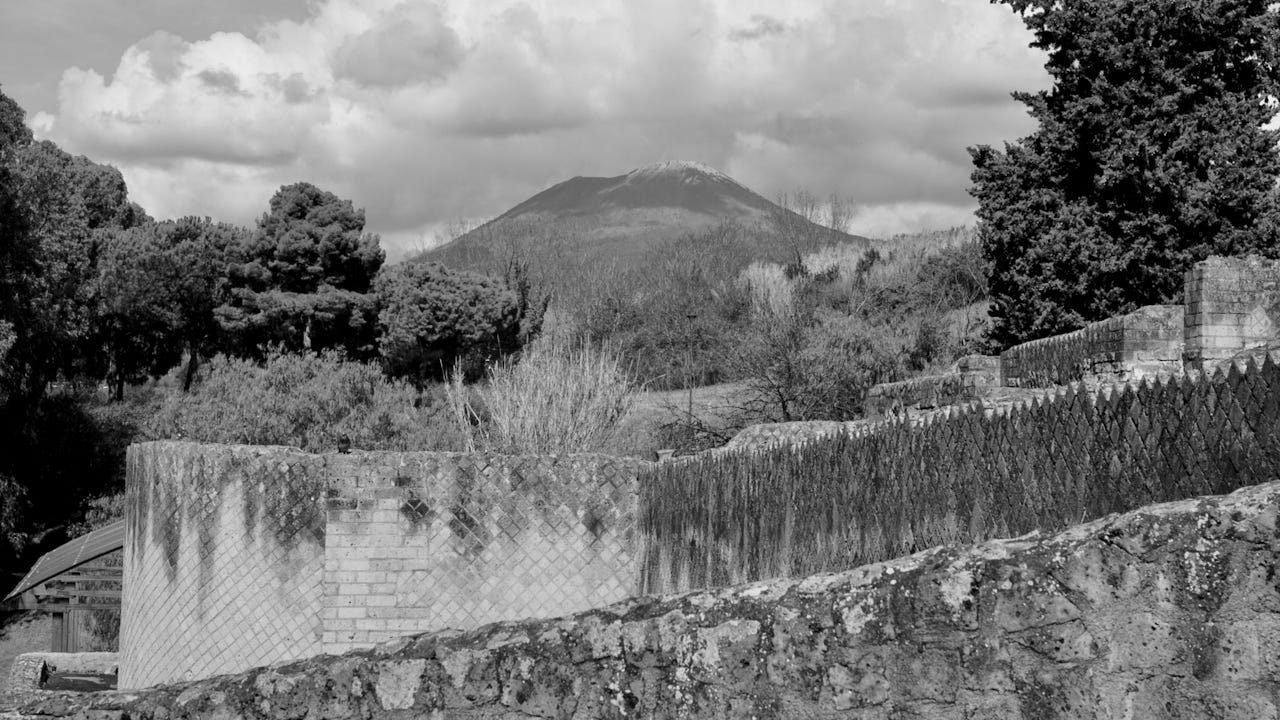Don’t sip from your drink when you read this sentence:
Research that was recently published in Scientific Reports presents the first human genome that has been successfully sequenced from a person who passed away in Pompeii, Italy, after Mount Vesuvius’ explosion in the year 79 CE.
Did you catch it? That dab of polish? The most startling euphemism that I’ve come across in recent months? In general, I strive to avoid speaking for other people, so let’s make this about me: if I’m ever in the wrong place at the right time and incinerated by molten lava, please feel free to say that I died. The wheezy cliché passed away is pretty much always tedious, but that’s especially true when the death occurs by volcano nearly 2000 years ago.
The previous paragraph, I find it curious to note, is more permissible because of that 2000 year gap. Not everyone scowls when they hear passed away, but I know that my criticism of that lazy, slippery phrase is more acceptable because Pompeii feels so distant. If I objected to that phrase during a quiet conversation in a funeral home, for instance, it would be a bit more coarse. Typically, the need for a euphemism diminishes with time, although I can’t quite comprehend the significance of that distinction myself. Whenever I hear this particular euphemism, regardless of the situation, someone, I sense, is lying to me, they’re massaging the words that they’re delivering to my ears. Sensing that words are fictional, that they’ve been sanitized, downgraded, softened, is what I find so troubling. Passed away sounds untrue, just as all clichés sound untrue.
And time seems to be the hidden variable in these phrases. Time alters what we perceive. Time alters meaning. Time even alters values. Perhaps there’s no alternative, though it does at least appear peculiar that closeness, in time, affects interpretation, even when it comes to our most important values. Yet that’s true whenever we wonder what’s right, as there’s always a constellation of values, endlessly pushing and pulling, so passed away magically transforms into died without any cries as the tragedy becomes more distant—the closer the actual event, the more intimate the sensation, the more that language is used to sooth or conceal or deflect.
But you, too, should expect the passage of time to influence how values are applied to you. As the years cascade, you’ll be a bit less unique, a bit less valuable, and much more a mere reflection of your age. Even though you’re known for all your particularities today, for all your distinctions, for all the ways in which you don’t conform to your time, those are nuances that will drop away over the years. What makes you an individual, for those who also live in your time, are those distinctions; it is what’s most enthralling and essential about the people that you meet, but that texture begins to dissipate once the current year takes the shape of a distant year. The bodies in Pompeii, for those reading these words, are much more similar than dissimilar, they’re all imbued with the same basic thoughts and characteristics and story, rather than the individualities that were obviously important to them.
In the same way, you might hesitate before a public reading of a private journal—unless that journal happens to have been written long ago, long enough for the specific person to be less important than their time. The importance that you’ll give to the writer’s privacy and individuality and whether you’ll describe the writer as dead or passed away will almost certainly be determined by time rather than what’s on the page. Artists, alas, lose individuality as the years pass: to explore the impressionists one hundred years ago involved more gradations between each artist than is recognized today. They are, today, more of a collective, more representative of a moment, even in how their work is viewed, than as individuals who lived particular lives.
As someone who believes that great art captures the individuality of the artist, that great art is by definition created in the first person, I admit that this is a rather troublesome notion, but I can’t ignore how much time alters meaning. Nor can I ignore the more pleasing conclusion which eventually arrives: if you’re an artist, one focused on a timeless creation, the only truth that you’ll ever feel occurs in this very moment, even if you’re fossilized and captured by lava. Knowing that this very moment is the finale can either be vertiginous or freeing—and the latter is certainly the correct choice. The truth should, I believe, prompt a yearning to explore reality without any silly euphemisms, without any need for gloves or blindfolds or silences, without any superficially comforting fictions. Perhaps that’s disturbing for some people, but I happen to find it more comforting—the unsanitized reality, the life that’s compelled to confront what happens now.



I’ve been planning my debut as an eccentric person for a few decades....
“the unsanitized reality, the life that’s compelled to confront what happens now”
Find this a balm in the midst of the “you don’t need to document every aspect of your life” slash-back. Why not? What the fuck else do we have to document, you fearful motherfuckers? X you’re marvellous, Charles.